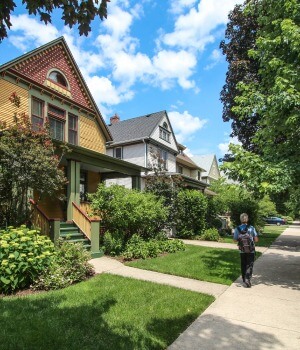Drug and Alcohol Statistics in Oak Park
Rarely do people overdose with one substance in their system. Many drug combinations are found in toxicology reports and medical examiner research. Here are the most common drug toxicity combinations in Suburban Cook County:2
19% were fentanyl and cocaine
16.88% were fentanyl and benzodiazepines
14.15% were heroin and cocaine
13.8% were fentanyl and alcohol
12.4% were heroin and alcohol
Some youth in Oak Park are also engaging in substance abuse. The latest youth health survey reveals the following:2
39% of 12th graders misuse alcohol
23% of 10th graders misuse alcohol
26% of 12th graders misuse tobacco or vaping products
Of the 12th graders who report misusing prescription painkillers, 58% say the drugs were given to them.2
Levels of Care for Rehabs in Illinois
For many Illinois residents, addiction treatment is a process of moving through multiple levels of treatment, from most to least intensive. For others, only the least restrictive levels are required.
Detox
Detox is the process of safely clearing your system of all drugs and alcohol. It occurs in a supervised setting to manage withdrawal symptoms. This process is often necessary before Illinois residents can enter a formal treatment program.
Residential or Inpatient
Residential or inpatient treatment is the most intensive treatment setting, involving 24/7 care. Medication, individual and family therapy, and recreational therapy are common forms of treatment at this level.
Partial Hospitalization Programs (PHPs)
In a PHP, participants receive much the same services as an inpatient program, but they return home during non-treatment times.
Intensive Outpatient Programs (IOPs)
IOPs are a step down from PHPs. These programs provide several hours of treatment over several days per week. Treatment usually includes individual and group therapy.
Standard Outpatient
Standard outpatient programs are the least intensive level of treatment. They require only two or three hours of care per week, usually at an outpatient clinic or therapist’s office. This option is appropriate for those with a strong support system who are highly motivated.
Aftercare
Also called relapse prevention, aftercare is focused on providing ongoing support for continued sobriety once a treatment program is complete. Aftercare can include 12-step meetings, transitional housing, therapy, and other supports.
How to Pay for Addiction Treatment in Oak Park, Illinois
Private Insurance
By law, all insurance companies must provide at least some coverage for substance abuse treatment. However, each plan differs, so Illinois residents must contact their provider to discover precisely what is covered by their plan. Deductibles and copays may apply.
Illinois Medicaid
Illinois Medicaid is a government program that provides health insurance for low-income individuals and families. To be eligible, Illinois residents must be a U.S. national, citizen, permanent resident, or legal alien, in need of health care/insurance assistance, and characterized as low income. They must also be either pregnant, responsible for a child 18 years or younger, blind, have a disability or family member with a disability, or be 65 years or older.
Illinois Medicare
Medicare is a federal health insurance program that provides coverage for Illinois residents aged 65 and older, as well as individuals with certain disabilities. Some forms of addiction treatment are covered under Medicare Part A, while other services are covered under Part B. Not all rehab facilities accept Medicare as a form of payment, so it’s important to confirm Medicare acceptance before starting a program.
TRICARE in Illinois
TRICARE in Illinois provides health insurance coverage for U.S. military personnel, veterans, and their families. This includes substance use disorder treatment services; however, plans differ in their specific coverage.
Sliding Scale Rehabs
State-funded rehab centers use government funds to help pay for treatment for Illinois residents who are otherwise unable to afford it due to lack of income or lack of insurance coverage. To get into a state-funded rehab, residents can contact the Illinois Health and Human Services Department for assistance.
IHS-Funded Drug Rehabs
The Indian Health Service (IHS) is a federally-funded program that provides health coverage for indigenous people. Under this program, Native Americans and Native Alaskans who need SUD treatment can receive low-cost or free services, even if they have other insurance coverage.

Local Information for Visiting Oak Park
If you are traveling to Oak Park to enter a treatment center or to visit someone you know in recovery, you will find many resources to make your visit easy, starting with the numerous ways to get to Oak Park. Several airports are within a short drive:
- Chicago Midway International Airport
- Chicago O’Hare International Airport
To get to an Oak Park drug rehab from the airport, you can choose from the following:3
- Go Airport Express shuttles and SUVs
- Regional buses
- Taxi cabs
- Ride-share programs
- Limousines
- Rental cars
- Public transit system
Traveling around the village of Oak Park and into the city can be done using:3
- Chicago Transit Authority rail or bus lines
- Zip cars
- Bicycling
- Metra
- IGo
Drug and alcohol rehabs in Oak Park provide detox and inpatient services for those needing intensive care at the beginning of recovery. If your withdrawal symptoms are mild and you have a good support system in place, you may choose to start treatment in an outpatient program. If so, you will need a place to stay. Oak Park has many great neighborhoods for your stay, whether for a short or extended visit. Housing options include:
- Hotels and motels
- Air BnB and VRBO vacation rentals
- Bed and Breakfasts
- Historical district manors and halls
- RV parks and campsites
- Apartments, condos, and townhomes
- Sober living houses
You won’t spend all your time in a Cook County drug rehab. Your aftercare plan will include community activities that support your new, sober lifestyle. Oak Park has an abundance of healthy activities to engage in and places to go such as:
- Libraries3
- Farmer’s market3
- Special events5
- Outdoor recreation4
- Support groups
- Spa and Wellness
- Theaters5
- Classes to learn a new hobby
Choose to make a fresh start in a place where you can access services to heal your whole self. Oak Park offers these and much more.
Illinois Drug and Alcohol Laws
Illinois policy makers have established the following laws regarding substances:1,2,3,4
Drug Possession: In Illinois, possession of drugs (except cannabis) is a felony in all cases. Felony charges can lead to jail time and a lifelong felony record.
Good Samaritan Law: The Emergency Medical Services Access Law of 2012 is the Good Samaritan Law in Illinois. This law is designed to encourage people to seek emergency medical assistance when someone is overdosing. If an Illinois resident calls 911 or brings someone to an emergency room for an overdose, both the victim who is overdosing and the person seeking help are protected from being prosecuted for felony possession of small amounts of drugs.
Pretrial Fairness Act: Effective Jan 1, 2023, this law gives police officers who catch people with small amounts of drugs discretion to release them with a citation that orders them to appear in court within three weeks. This is a change from the previous law which put that person immediately in jail for a few days until they were brought before a judge
DUI Laws: “Driving Under the Influence” is defined as “operating a motor vehicle while impaired by alcohol, other drugs, including cannabis (marijuana) prescribed for medical purposes, or intoxicating compounds and methamphetamine.” In Illinois, drivers are considered under the influence if they have a BAC of .08 or higher, have a THC concentration of either 5 nanograms or more per milliliter of whole blood or 10 nanograms or more per milliliter of other bodily substance, have used any other controlled substance, or are impaired by medication. A first conviction of DUI is a Class A misdemeanor with a minimum penalty of revocation of driving privileges for one year and suspension of vehicle registration.
Resources
- Cook County Public Health. 2022. The Opioid Epidemic.
- Illinois Department of Human Services and the Center for Prevention Research and Development. 2020. Illinois Youth Survey 2020 County Report Cook-Non-Chicago.
- Oak Park. 2022. The Village of Oak Park.
- Cook County Government. 2022. Resident Services.
- Downtown Oak Park. 2022. Plan a Visit.


